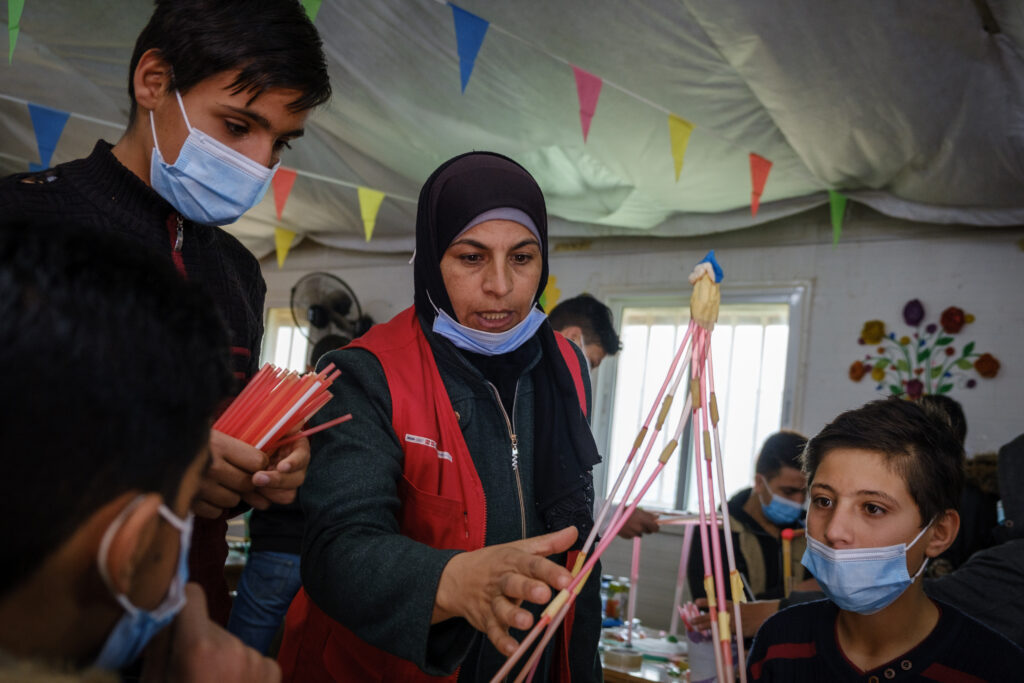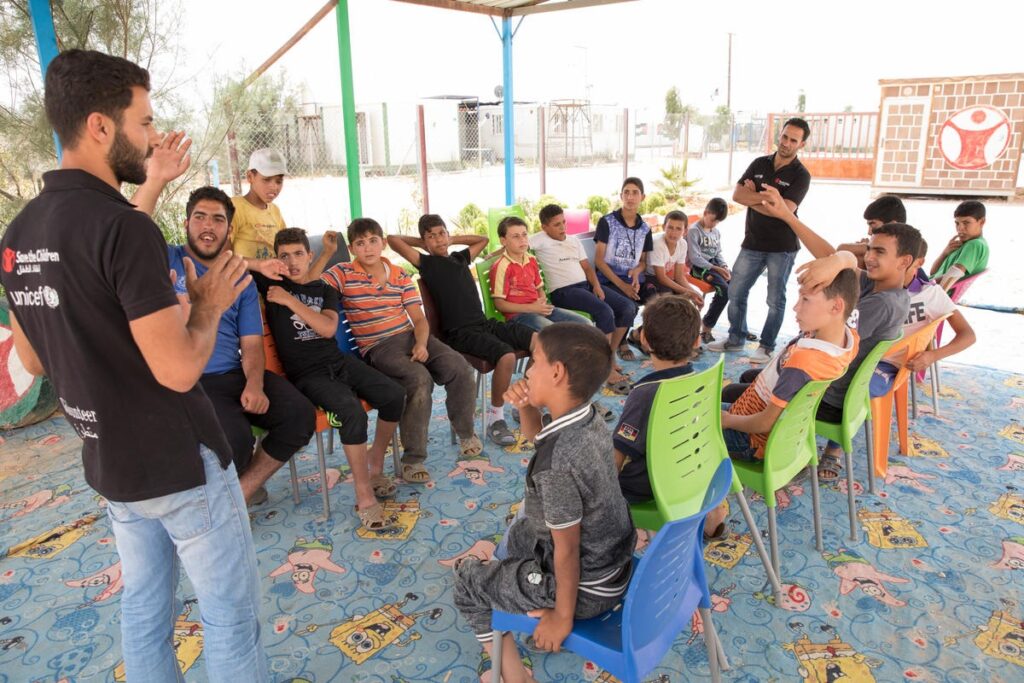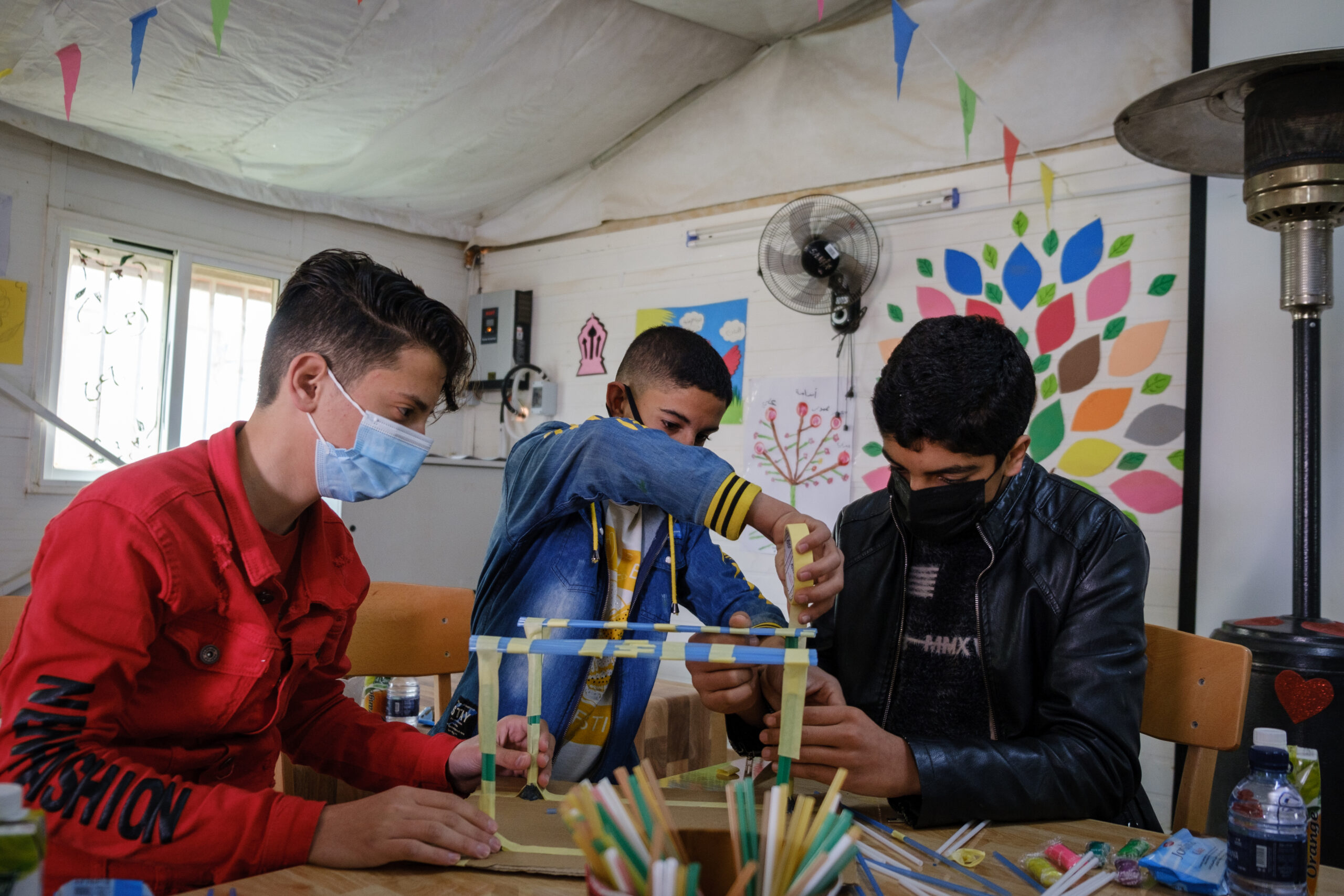Strategies
To work towards a social norm against all forms of child labour among all stakeholders – communities, governments and local businesses – WNCB implemented a combined approach of strategies. Our community work with parents and women in particular, and our work with the government, were particularly important in moving the needle on child labour, community norms and opportunities for families in East Ammam and Za’atari camp.
Our strategies included comprehensive case management, strengthening community-based interventions for children and positive parenting methods to prevent and respond more effectively to child labour. We supported family livelihoods, particularly for women in the areas, through vocational training and by providing business start-up kits. And we worked with the government to promote multi-stakeholder cooperation, improve child labour laws and policies, and more.
Strengthening community-based child interventions: Child Protection Committees
Community-based child protection mechanisms, which aim to strengthen the position of both children and their caregivers or parents, are essential for preventing and responding to child labour.
They are the umbrella systems within a community from which all actions to support children and families are organised and monitored, including case management services. Our partners therefore focused on establishing Child Protection Committees (CPCs) in East Amman and Za’atari.
We established three CPCs in East Amman, Za’atari camp and Za’atari village. We worked with the Ministry of Labour (MoL) to support and train these CPCs. This included establishing and equipping Talent Hubs, and recruiting and training local partner staff in various areas including case management, child protection, healing through art, life skills development, parenting education and child protection.
To strengthen the CPCs, we also trained 42 members on labour law, children’s rights, community initiatives and gender equality. This empowered and equipped them to raise awareness in their communities and combat child labour.
Once established, the CPCs conducted awareness-raising sessions on children’s rights, protection from child labour, child protection and the importance of education for children. At the Talent Centres (or Talent Hubs) in East Amman and Za’atari, we provided skill-building activities and safe experiences for working/at-risk children, such as life skills, IT skills and arts, to enhance their self-esteem, decision-making skills and well-being. Save the Children Jordan also held positive parenting sessions for caregivers at the Talent Hubs, trained caregivers in vocational and livelihood skills, and distributed household start-up kits.
The CPCs conducted more than 16 awareness sessions, reaching 181 children and 131 community members during the programme period. In addition, CPC members conducted four community initiatives in East Amman, Za’atari camp and Za’atari village, focusing on the risks of child labour and the importance of education.
Comprehensive case management for children and their families
Comprehensive case management for children and families addresses the root causes that lead families to resort to negative coping mechanisms such as child labour and child marriage. It is a thorough process involving identification of children in the community, assessment of the situation, planning and implementation. Case management has enabled us to refer children (and their parents) to the right service providers, for example in the areas of education, livelihoods, mental health and psychosocial support.
Case management and appropriate referrals can help overcome barriers to education, such as a lack of adequate family income that forces children into child labour, or a health problem of a parent or caregiver that results in children having to work. When families are more economically stable and capable, children are safer, don’t have to work and can go to school. Case management improves access to quality services for child labourers, those at risk and their families.
Read more about referrals to economic service providers for economic empowerment under ‘Livelihoods for women and families: vocational training and business start-up kits’.
Positive Parenting sessions
A safe home is key to preventing child labour. To ensure that children in our target areas have a safe home environment, we introduced positive parenting sessions.
The sessions, aimed primarily at mothers, addressed social and gender norms that are among the root causes of child labour. They provided caregivers with positive parenting ideas and tools to help them manage stress, look after themselves and understand children’s rights, child development and relationships. As mothers pass on the knowledge and skills they learn to their husbands, the positive parenting sessions can also reduce domestic and gender-based violence.
We have specifically targeted mothers and women for our positive parenting sessions. In the communities in the programme areas, fathers are the main breadwinners and mothers are the main caregivers. This meant that mothers typically take a more active role in their child’s upbringing than fathers. Besides that, fathers are less likely to attend any type of sessions due to work commitments. That’s why women were central to this strategy.
Our positive parenting sessions taught mothers about education and the impact of work on their child’s development. Another important topic we covered was communication with their (teenage) children. Good communication helps parents understand their children’s needs and gives them a better idea of the risks of work. With good communication skills, parents can eventually encourage their children to continue their education and reduce their working hours or, if possible, get out of child labour.
Some young mothers found it difficult to attend our training due to childcare responsibilities and transport difficulties. To accommodate them, and to encourage and inform as many mothers as possible, we held the sessions locally, with flexible hours and transport support. Mothers who attended recommended the positive parenting sessions to their neighbours, increasing demand and reach.


Livelihood for women and families: vocational training and business start-up kits
One of the causes of child labour is poverty, often partly caused by lack of access to work and adequate income for adults and parents. Our approach to poverty and lack of work opportunities in programme areas was to help families and young people find alternative sources of income. When parents and adults can work, they no longer have to rely on their children for financial support. This is vital in the elimination of child labour.
Our partners’ livelihood and income generation efforts emphasised women’s economic empowerment. We know that income-generating activities work best with mothers, who invest the most in a child’s development and education. We specifically referred women and mothers to economic service providers. For example, we gave mothers small business grants to start home-based projects. At our Talent Hubs, we offered skill-building activities such as soft skills training for parents and children. Women and mothers were also able to improve their labour market skills through vocational training. Our partners also engaged mothers and children in awareness-raising activities on child labour and gender-based violence. As a result, children in the areas where we worked were able to stop working, live in a safe environment and go (back) to school.
Youth in the area received development training, including life skills, business ethics and business development training, to help them access better livelihoods.
As part of a sustainable solution to child labour that will outlive the WNCB programme, one of our partners has developed a gig platform (Mofeed) to provide livelihoods for families who previously relied on children for household income. The platform connects parents and caregivers to the labour market, improves adults’ professional skills and portfolios to meet customer demand, and helps them offer their skills to a wider market. This enables adults in the communities to earn more income and prevents them from forcing children to work.
Working with the government to strengthen the national protection system
During the programme period, our partners worked closely with the Government of Jordan to strengthen the national protection system to prevent and respond to child labour.
To improve child labour laws and policies, our partners worked with the National Council for Family Affairs (NCFA) and the Ministry of Social Development (MoSD). Our partners also supported the NFCA to lead the National Child Labour Task Force. This group coordinates responses to child labour in the education, economic, social security and child protection sectors.
Since our involvement, the National Child Labour Task Force has made it easier for different organisations to work together on child labour cases. It has also helped government organisations and NGOs to work better together. The National Child Labour Task Force has been recognised for its role in national coordination, bringing together NGOs and government institutions to coordinate national efforts to combat child labour.
To improve the government’s capacity to collect and analyse data on child labour, we supported the NCFA in organising a workshop with the National Child Labour Task Force and the Department of Statistics. UNICEF will continue to support the NCFA’s efforts to include data on child labour in future national surveys.
WNCB partners also worked with the Child Labour Taskforce (CLTF) to advocate for stronger government action on child labour. Four meetings were held with government officials from the Ministry of Education (MoE), the Ministry of Social Development (MoSD), the Ministry of Labour (MoL) and the Family Protection and Juvenile Department of the Public Security Department of the Ministry of Interior to discuss the national child labour strategy.
To respond quickly and comprehensively to child labour, we helped MoSD open a new helpdesk in Zarqa governorate. The helpdesk is the main place where cases of child labour are reported, tracked and addressed. It also provides referrals to various services. Twelve MoSD social workers received training on standard operating procedures to help them better respond to child labour cases. The training will help them continue to provide these services after the project ends.
At the national level, we updated the child labour framework, issued standard operating procedures based on the national framework, updated the child labour strategy and developed a child labour by-law for MoSD. This enabled NCFA to lead coordination and advocacy efforts at the national level through the National Child Labour Working Group. We also worked with MoSD and other national partners to ensure case management services for working children in target areas.
Strong government leadership of a national child labour working group fostered collaboration among national stakeholders, including ministries, inter-agency partners and national organisations. This allowed UNICEF to work with its national partner, Rowad Alkair, and other government partners, including the National Council for Family Affairs and the Ministry of Social Development, to implement project activities on time.
“When children go outside the camp to work, you can see their mentalities changing. They become tougher, more negative. In this program, we try to take the negative energy out of them. We try to teach them about sharing and teach them the spirit of teamwork. After a while you can see them changing in a positive way.” – Ghofran, Volunteer Save the Children / WNCB

